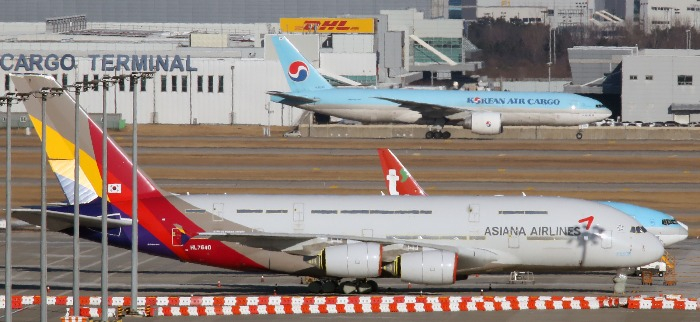South Korea’s antitrust regulator the Fair Trade Commission (FTC) has decided on conditional approval for Korean Air Lines Co.‘s 1.8 trillion won ($1.5 billion) acquisition of its domestic rival Asiana Airlines Inc., following the two airlines' main creditor Korea Development Bank's prodding in September to swiftly finish the merger plan review. On Dec. 29, the FTC filed a business combination screening report listing the conditions.
After receiving the two carriers' feedback on the report, the FTC will hold a meeting in January 2022 to confirm the approval. Once the deal is completed, the merged entity will become the world’s seventh-largest airline. However, the merger deal needs regulatory approval from antitrust agencies of seven other nations -- the US, EU, the UK, Japan, China, Singapore and Australia. As of November of this year, the merger plan had received approvals from Turkey, Taiwan Thailand and Vietnam.
RETURNS OF SLOTS, FLIGHT LICENSES
Korean Air, the country’s flag carrier, agreed to purchase a 63.9% stake in Asiana in November 2020 and reported its business combination plan to FTC in January of this year. To address monopolistic concerns over the merger, the FTC has established certain conditions, including that the two carriers return some of their airport landing slots and flight licenses to operate planes in certain routes. FTC also said that it will restrict flight fare increases and prohibit flight service reductions by the time that landing slots and flight licenses return.
FTC has analyzed about 250 routes of the two carriers, Korean Air’s budget carrier Jin Air Co. as well as Asiana’s low-cost carriers Air Busan Co. and Air Seoul Co., and evaluated the restriction effect of market competition in 119 market segments, including 87 segments for passenger planes, 26 for cargo planes and six for others.
The Korean antitrust body has concluded that, if the deal is completed, flight operations on 10 routes including between Incheon and Los Angeles, New York, Seattle, Barcelona, Zhangjiajie, Phnom Penh, Palau and Sydney and between Busan and Nagoya and Qingdao will be 100% dominated by the merged entity. The two carriers already dominate 70% of routes between Korea and overseas.
FTC said the two carriers should return flight licenses in certain routes, monopolized by the two carriers and lacking bilateral air service agreements. Given that Korea has signed the agreements only with the US, it implies that they have to return the licenses related to Europe, China, Southeast Asia and Japan to the Korean government, which will redistribute the licenses to other domestic carriers.
| Number of international routes operated by Korean Air and Asiana Airlines |
| Korean Air |
Region |
Asiana Airlines |
| 50 |
Northeast Asia |
44 |
| 26 |
Southeast & Southwest Asia |
16 |
| 14 |
North America |
5 |
| 18 |
Europe and Middle East |
7 |
| 2 |
Oceania |
3 |
| 110 |
Sum |
75 |
(As of January 2020)The two carriers will have to return daytime domestic airport landing slots. As of pre-pandemic 2019, Korean Air took 24% of Incheon airport landing slots while Asiana took 16%. Adding their budget airline affiliates' landing slots, the combined slots share during the daytime reached 57%.
FTC didn’t mention how many slots the two carriers should return, but it said the return should be enough to prevent market competition restrictions and market share increases. Regarding the transfer of overseas airport landing slots, the FTC will determine these after discussions with the Ministry of Land, Infrastructure and Transport of Korea.
'IT WILL ONLY HELP FOREIGN AIRLINES'
Market speculators said that FTC will hold additional meetings next year if any of the seven overseas authorities don’t approve the takeover. In that case, the conditions FTC has set up could be amended.
“The overseas authorities’ review on the business combination report is very important,” said an official from FTC. “The two carriers will have to undergo a long process to convince the foreign authorities. We will continue to negotiate with the overseas authorities in case we need to address conflicts between the authorities’ recommendations,” he added.
Meanwhile, the industry watchers said FTC's decision will only help foreign airlines increase their flight services in and out of Korea while decreasing Korean air industry's competitiveness. They said, even if the two carriers returned some of the flight licenses for long-distance routes, big aircraft for long distances wouldn't be affordable for domestic LCC and foreign airlines will purchase the licenses instead. The watchers also said that more passengers will choose China or other Asian countries for transit, instead of Korea, if the two carriers return Incheon Airport's landing slots.
Write to Jeong-min Nam, Kyung-min Kang and Ji-hoon Lee at
peux@hankyung.comJihyun Kim edited this article.







